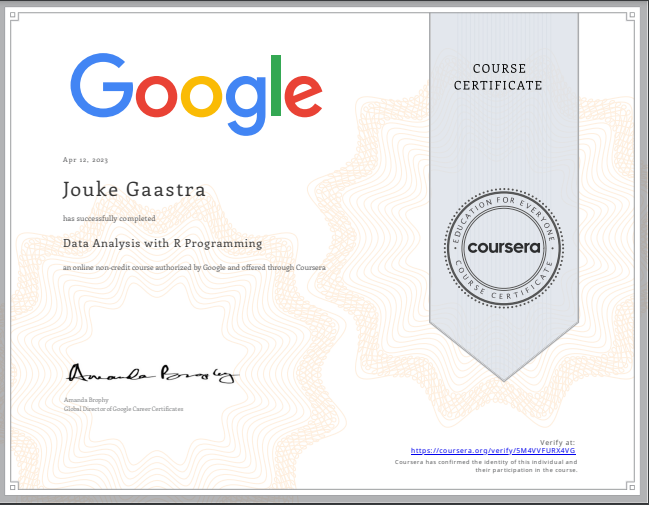Buttom Line Up Front:
Coursera provides a low-risk, high-quality learning environment. The free trial period offers a perfect opportunity to test the waters before committing time and resources to a full program.
Staying relevant means continuously updating your skills. I completed the Data Analysis with R Programming course on Coursera in April 2023, shortly after finishing my master’s in sociology. This course is part of the Google Data Analytics Professional Certificate program.
Context and Motivation
My journey into R programming stemmed from a practical observation: SPSS was losing ground to open-source alternatives. At the University of Groningen, where I completed my sociology master’s, SPSS was the standard tool, but they were planning to switch to R. As I was anticipating future research work, learning R seemed like a smart move to stay ahead of this transition.
This wasn’t my first experience with Coursera. Before starting my sociology master’s, I had taken an introductory sociology course on the platform. The quality was so good that I found myself returning to the material years later during an ethics class in my second master’s program in Risk Analysis at UIS.
The Coursera Experience vs. Traditional Education
Having experienced both traditional university online programs and Coursera courses, I’ve noticed clear differences in quality and approach. When it comes to purely online learning with minimal interaction, Coursera has always outperformed online university programs I’ve encountered. Their courses feature high-quality video production, clear audio, professional visualisations, detailed transcriptions, and well-cited source materials.
However, education isn’t just about content delivery. University programs that incorporate personal feedback and meaningful interaction offer something Coursera can’t replicate. The dynamic discussions with professors, real-time feedback on work, and collaborative projects with peers create a richer, more motivating learning environment.
So for purely online, self-paced learning, Coursera is very good. But when universities offer genuine engagement and personalised guidance alongside their content, they typically provide a more comprehensive educational experience.
The Value Proposition
When considering online certificates, it’s important to maintain realistic expectations:
- Career Exploration Tool: Coursera offers an excellent platform for testing the waters in new fields. The free trial period is particularly handy when just exploring a new field. The free trial will probably not be long enough to complete a course.
- LinkedIn Recognition: While you can proudly display these certificates on LinkedIn, it’s worth noting that they don’t carry the same weight as traditional university degrees. However, they demonstrate initiative and a commitment to continuous learning – traits highly valued by employers.
- Networking Opportunities: Sharing your learning journey can lead to unexpected connections. In my case, adding the certificate to LinkedIn helped me reconnect with a former classmate who noticed my venture into data analytics.
- Recognition: In certain cases, courses can provide ECTS as well. But only for certain programs, and only certain universities will accept it. So check thoroughly before committing.
Pricing and Access Options
Prices have gone up quite a bit since I did my last course on Coursera. As of 2024, Coursera offers flexible pricing options through their Coursera Plus subscription:
- Monthly subscription: $59/month (cancel anytime)
- Annual subscription: $399/year (14-day money-back guarantee)
- Special New Year offer: $199 for a full year of unlimited access
All plans start with a 7-day free trial, giving you a chance to explore the platform before committing. This trial period is valuable, though it’s worth noting that it isn’t long enough to complete an entire course.
The Reality Check
It’s important to address the elephant in the room: the rise of AI has made it relatively easy to cheat on online assessments. This reality somewhat diminishes the credibility of online certificates as pure skill validators. However, the true value lies in the learning process and knowledge gained, not just the certificate itself.
Personal Takeaway
While the course lacks the personal interaction of traditional classroom settings (though AI-generated feedback can substitute a bit), it excels in delivering structured, high-quality content. The flexibility to learn at your own pace and explore new fields without significant financial commitment makes it an attractive option for both casual learners and career changers.
Recommendation
I recommend Coursera if you’re looking to:
- Update your technical skills
- Learn something new out of curiosity
- Make a career transition
Coursera provides a low-risk, high-quality learning environment. The free trial period offers a perfect opportunity to test the waters before committing time and resources to a full program.


Leave a Reply